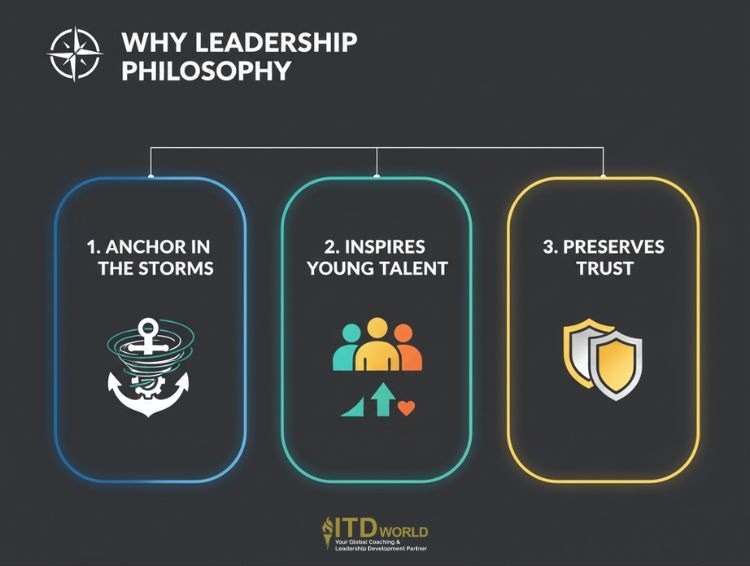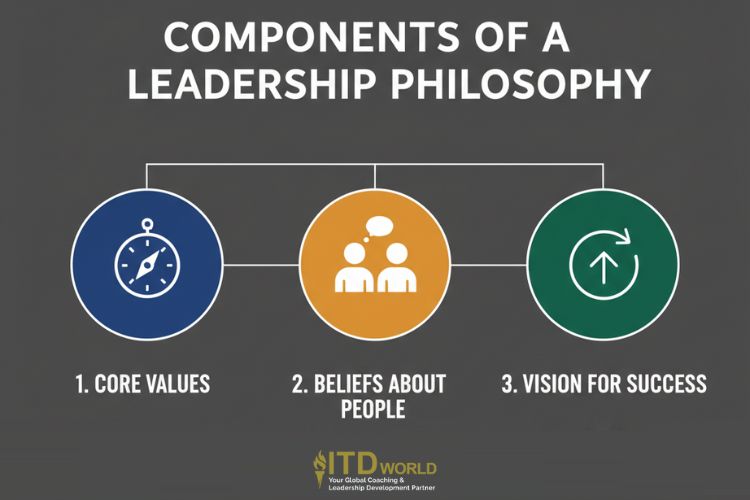Discover what it means to have a personal leadership philosophy, plus how to craft a robust one and truly live it in the workplace.
The most effective leaders don’t simply adopt a popular leadership “style”; they lead from a solid, personal foundation built on their own principles. This foundation is their leadership philosophy – a clear and coherent inner framework that allows them to be both adaptable and consistent, inspiring authentic trust that lasts for long.
|
Author: Jonathan M. Pham |
Highlights
- A personal leadership philosophy is a concise statement outlining a leader’s core values, beliefs about people, and vision for their impact, acting as a guiding “user manual” for how they lead.
- In today’s complex business world, having a solid personal philosophy is crucial for manager to navigate uncertainty, inspire their teams through authenticity and purpose, and prevent the high cost of inconsistency that erodes trust and engagement.
- A robust leadership philosophy is based upon three main components: core values (your foundational “true north”), beliefs about people (your perspective on what motivates others), and a vision for success (the ultimate impact you aim to achieve as a leader). Additionally, it must be authentic to the individual, actionable enough to guide real-world decisions, and aligned with the organization’s values and goals.
- A leadership philosophy transitions from a mere statement to a powerful daily practice when leaders consistently translate it into action by aligning their time and decisions with their stated principles, actively seeking feedback – as well as when organizations foster a culture that encourages philosophical leadership and integrates its development into training.
What is Leadership Philosophy?
A personal leadership philosophy is a concise, explicit statement of a leader’s core values, fundamental beliefs about people, and the vision they have for their own impact. Think of it as the “user manual for how one leads” – a personal set of principles that provides a reliable filter for decision-making, especially when faced with complexity or pressure.
It is important to distinguish what a philosophy is from what it is not:
- It is much deeper than a leadership style. A philosophy is the “why” that informs how you lead. For example, your philosophy might prompt you to adopt a “servant“, “transformational“, or “coaching” approach in different situations.
- It is a compass, not a cage. A robust philosophy provides direction and consistency, but it should not cause rigidity. Rather, one needs to allow for adaptability while ensuring their actions remain rooted in core principles.

Example: A leader might articulate their philosophy as follows: “To lead with integrity and curiosity (values). I believe that empowered people with the right resources will always come up with the best solution (beliefs about people). My goal is to build a team where everyone feels safe to innovate and can do the best work of their careers (vision).”
This simple statement now serves as a powerful guide for that person’s daily decisions – from how they run meetings to how they handle mistakes.
The Importance of Having a Personal Leadership Philosophy
Back in the day, having a personal leadership philosophy might have been considered a thoughtful intellectual exercise. And yet, in today’s complex business world, it has become a critical necessity. The decision to consciously define and live by a set of principles has been proven to have a direct and measurable impact on one’s ability to navigate uncertainty, inspire their teams, and drive sustainable results.
- An anchor in challenging times
Given the current volatile, uncertain, complex, and ambiguous (VUCA) world, leaders are faced with constant change and novel problems. A clear philosophy acts as a stable internal compass, providing a consistent framework for making sound decisions when there is no established playbook to follow. It ensures one’s actions remain coherent and purposeful, even when external factors are chaotic.
- Inspires a new generation of talent
Modern workforces, especially Millennials and Gen Z, are not motivated by top-down authority alone – but by authenticity and purpose. According to Deloitte’s 2025 Gen Z and Millennial Survey, these generations consistently report that they will make employment choices based on a company’s – and a leader’s – personal values. Many of them are more likely to be loyal to a leader whose philosophy they understand and respect.
- Prevents the high cost of inconsistency
A leader without a guiding set of principles is likely to be perceived as unpredictable, random, arbitrary, or self-serving – thereby losing the trust of others. Research has consistently shown that inconsistent management is a major driver of disengagement. A lack of trust leads directly to lower productivity, higher anxiety, and increased employee turnover – all of which carry significant business costs.
Read more: Talent Philosophy – Unlocking Workforce Potential

Examples of Great Leadership Philosophies
Some of the most impactful leaders in recent history were guided by deeply held personal philosophies that shaped every decision they made.
- Kazuo Inamori & “Keiten Aijin”: The late founder of Kyocera and KDDI, Dr. Kazuo Inamori, built a global business empire on the simple philosophy of “Keiten Aijin” (敬天愛人), which translates to “Respect the Divine and Love People.” He taught his leaders that every decision should be guided by the question, “What is the right thing to do as a human being?” His values-driven approach was credited with creating a culture of deep integrity – and was central to his legendary turnaround of Japan Airlines.
- Nelson Mandela & Ubuntu: The Southern African philosophy of Ubuntu, frequently translated as “I am because we are,” was a cornerstone of Mandela’s leadership. By embodying this belief in shared humanity and interconnectedness, he was able to lead South Africa out of the deep divisions of apartheid, focusing on reconciliation and community rather than retribution.
Philosophical leadership approach
Developing Your Leadership Philosophy: Understanding the 3 Main Components
A powerful leadership philosophy is not just a vague, feel-good statement – but a well-defined construct with clear, integral components that work together to guide one’s actions. It is built upon three key pillars as follows:
-
Core values (Foundation)
The set of basic rules that guide one’s behavior and decision-making. These values represent your personal “true north”; they address the question, “What do I truly stand for – as a person and as a leader?”. Uncovering them typically requires you to engage in a self-reflection process as follows:
- Think of a leader you deeply admire (in any field). What specific qualities do they possess that you respect most?
- Recall a moment in your career when you were most proud of your actions. What values were you honoring in that moment?
- Consider a time you had to make a difficult ethical decision. What principle guided your choice?
As you review your answers, try to distill 3-5 keywords that represent your “true north” (e.g. Integrity, Courage, Compassion, Connection, Growth, Excellence, etc.).
Contrary to popular beliefs, a leadership philosophy is not something to be invented; it is something to be discovered. It already exists within you, shaped by your experiences, values, and worldviews.
-
Beliefs about people (Perspective)
Your fundamental view of human nature and what motivates people to do their best work. It answers the question, “What do I believe brings out the best in others?”
Example: One might say, “People are naturally creative and will do their best work when given autonomy and trust.” Another might believe, “People need clear structure and direction to perform optimally.” Neither view is inherently right or wrong, and yet the choice of which belief to adopt will fundamentally shape one’s day-to-day management approach.
To articulate your own perspective, ask yourself:
- When have you seen a team perform at its absolute best? What conditions were present that allowed for that success?
- Do you believe people are primarily motivated by external rewards (like bonuses) – or by internal purpose and a sense of autonomy?
- What is your responsibility to your team members as human beings, beyond their roles as employees?
Read more: Human Leadership in a Digital World – Skills & Strategies for Success
-
Vision for success (Destination)
The ultimate impact you wish to have as a leader. It goes beyond project goals or KPIs and tackles the question, “What does a thriving, successful team look like to me? WHY do I lead?”
Below are a few prompts to reflect upon:
- Beyond hitting this quarter’s targets, what is the impact you want to have on your team members?
- What do you want your team to say about your leadership/ presence when you are not in the room?
- What kind of team or culture do you wish to build and leave behind as your legacy?
Sample vision statement: “My purpose as a leader is to create an environment where talented people can collaborate to solve meaningful challenges and grow beyond their own expectations.”
Read more: Intent vs Impact in the Workplace – How to Close the Gap

Assemble Your Leadership Philosophy Statement
Having the above-mentioned components is the first step, but to be truly effective, a leadership philosophy must pass a simple three-part test.
- Is it authentic?
The philosophy must be a genuine reflection of who you ARE, not who you THINK you should be or what sounds impressive. A forced ideology will be immediately transparent to your team – and will erode trust rather than foster it.
- Is it actionable?
It must provide clear guidance for your real-world decisions and behaviors. If your philosophy is too abstract or vague (e.g., “I believe in being a good person”), it will be useless when you are faced with a high-pressure, complex situation.
- Is it aligned?
While your philosophy is personal, it must be compatible with the core values and strategic goals of the organization. A severe misalignment will create constant friction for you and your team.
Example: A leader whose management approach is built entirely on “rapid experimentation and embracing failure” is likely to struggle in a highly regulated industry like aviation, where the organizational culture must prioritize “safety and process adherence” above all else.

Once you are confident in your direction, it’s time to combine everything together into a clear, concise, and memorable statement. A simple and effective structure is:
I lead by [Your Core Values]. I believe that my team [Your Beliefs About People]. My ultimate goal as a leader is to [Your Vision for Success].
Putting the examples from the previous steps together, a complete statement might look like this:
“I lead by upholding integrity, courage, and connection. I believe that my team thrives when given a clear purpose and the trust to figure out the how. My ultimate goal as a leader is to create an environment where we can solve meaningful challenges and grow beyond our own expectations.”
Remember, the goal is authenticity, not perfection. Your statement should sound like you, not like something copied from a business book. Instead of trying to craft the “perfect” philosophy, it’s much better to articulate one that you can genuinely live by every day – a living document that can (and should) evolve as you learn and grow as a leader.
Read more: Leadership Branding – Crafting an Inspiring Personal Identity
Living Your Leadership Philosophy: From Statement to Daily Practice
A leadership philosophy is useless if it is merely saved in a document. Its true power is only unleashed when it is consistently translated into action. The most common point of failure is not in the creation of a philosophy, but in the execution – the “say-do gap” between the leader you aspire to be on paper and the one you are in your daily interactions.
Below is a practical guide for closing that gap.
For the individual: How to “walk the talk”
- Make your calendar reflect your philosophy
A leader’s calendar is an honest record of their true priorities. To live your philosophy, you must align how you spend your most valuable resource – your time – with what you claim to value.
Example: If you proclaim that your ideology is “developing people,” your calendar should have protected, recurring time blocks for one-on-one coaching and mentoring sessions. If you consistently cancel these meetings for “more urgent” operational tasks, you are essentially saying that your real priority is operations over people.
Read more: Leading by Example – Key to Truly Inspiring Action & Trust
- Use it as a decision-making filter
Your philosophy becomes most powerful when it is used as a tool for navigating difficult decisions, especially under pressure. It provides a reliable internal compass when the path forward is unclear.
Example: When faced with a tough choice between two viable options, a leader may consciously pause and ask, “Which option is most aligned with my core values of integrity and transparency?” Using their ideology as a filter ensures that decisions are consistent and structured, not just convenient or reactive.
- Be accountable and adaptable
Nobody is perfect; there will inevitably be days where you fail to live up to your own standards. That being said, it’s crucial to acknowledge these moments with humility and be open to refinement.
How-to: Actively ask your team for feedback, such as, “In what areas am I living up to my stated philosophy, and where do you see a gap?” Additionally, it may be a good idea to revisit your statement annually to see if it still feels authentic/ fitting as you learn and grow.
Read more: Leadership Feedback – Key to Changing for the Better
For the organization: Promoting a culture of philosophical leadership
It is recommended that companies strive to establish an environment where this kind of intentional, values-based leadership is the norm, not the exception.
- Encourage leaders to share their philosophies
When leaders discuss their personal “user manuals” with their teams, it demystifies their decision-making process, promotes trust, and sets clear expectations for how the team will work together. In other words, it opens the door for richer, more honest conversations.
- Integrate philosophy development into leadership training
The most effective organizations don’t leave this crucial work to chance. Instead, they make the process of crafting, refining, and sharing a personal leadership philosophy a core and required component of their formal development programs for managers at all levels.
Leadership Philosophy Template
Purpose of This Tool:
This template is a guided worksheet to help you reflect on your core beliefs and craft a first draft of your personal leadership philosophy. Use this space for honest self-discovery. The goal is not perfection, but clarity and authenticity.
Section 1: My Core Values (My Foundation)
From the list below, circle the 3-5 values that resonate most strongly with you as a leader. Then, for your top 3, explain why they matter and what they look like in action.
| Integrity | Courage | Compassion | Growth |
| Accountability | Transparency | Innovation | Resilience |
| Trust | Collaboration | Fairness | Curiosity |
Value 1:
Why this value is important to me:
In action, this value looks like:
Value 2:
Why this value is important to me:
In action, this value looks like:
Value 3:
Why this value is important to me:
In action, this value looks like:
Section 2: My Beliefs About People (My Perspective)
Complete the following sentences to clarify your fundamental beliefs about your team.
I believe people do their best work when…
I believe the primary role of a leader is to…
I believe a team’s full potential is unlocked by…
Section 3: My Vision & Purpose (My Destination)
Complete the following sentences to articulate the impact you want to have.
My ultimate goal for my team is to create an environment where…
The legacy I want to leave as a leader is…
I lead because (My “Why”)…
Section 4: My Leadership Philosophy Statement (First Draft)
Use the insights from the sections above to assemble your personal leadership philosophy statement.
A simple structure to follow:
As a leader, I am committed to the values of [My Core Value 1], [My Core Value 2], and [My Core Value 3].
I believe that people [My Core Belief from Section 2].
Therefore, I will lead by [A specific action that reflects your values] and [Another specific action] in order to create a team where [My Vision from Section 3].
Next Steps:
Review this draft. Does it feel authentic to you? Does it provide clear guidance? Share it with a trusted mentor or coach to get feedback and refine it over time.
Read more: Thoughtful Leadership – Why It Matters in Today’s Hectic World
Leadership Philosophy Quotes
Check out more leadership quotes here!
The very essence of leadership is that you have to have a vision. You can’t blow an uncertain trumpet.
Theodore M. Hesburgh
People buy into the leader before they buy into the vision.
Earn your leadership every day.
Michael Jordan
Leadership is action, not a position.
Donald H. McGannon
A genuine leader is not a searcher for consensus but a molder of consensus.
Martin Luther King, Jr
I am a leader by default, only because nature does not allow a vacuum.
Desmond Tutu

Philosophical leadership quotes
Leadership Philosophy Books
- 📘 Start with Why by Simon Sinek
Core idea: Great leaders inspire action by starting with a clear sense of purpose – their “why.”
Why read it: Sinek’s book should allow you to uncover your own motivations and use them to rally others around a shared vision. It’s a foundational read for purpose-driven leadership.
- 📘 Good to Great by Jim Collins
Core idea: Based on a five-year research project, Collins explores why some companies make the leap to greatness, while others don’t.
Why read it: It introduces the concept of Level 5 Leadership and emphasizes humility, discipline, and the power of the right team.
- 📘 Leaders Eat Last by Simon Sinek
Core idea: Trust and safety are the cornerstones of high-performing teams.
Why read it: Sinek draws from biology and case studies to show how leaders who prioritize their people create resilient, loyal organizations.
- 📘Dare to Lead by Brené Brown
Core idea: Vulnerability is not weakness; it’s the birthplace of courage and innovation.
Why read it: Brown blends research with storytelling to teach how emotional intelligence and empathy are essential leadership tools.
- 📘The 21 Irrefutable Laws of Leadership by John C. Maxwell
Core idea: Leadership is governed by timeless principles that, when followed, lead to influence and success.
Why read it: A practical, easy-to-digest framework that’s especially helpful for new or developing leaders.
- 📘Legacy by James Kerr
Core idea: Lessons in leadership from the All Blacks, one of the most successful sports teams in history.
Why read it: It’s a powerful blend of culture, humility, and continuous improvement – ideal for leaders who wish to leave behind a lasting legacy.
- 📘The 5 Levels of Leadership by John C. Maxwell
Core idea: Leadership is a journey through five levels, from position-based authority to legacy-building influence.
Why read it: The book offers a clear, actionable roadmap for those looking to grow beyond a title, cultivate a sustainable leadership pipeline through coaching and mentoring.
How ITD World’s Leadership Training Solutions Can Help
At ITD World, we specialize in guiding leaders through the process of discovery, articulation, and application. Our programs are designed to create the space and provide the tools for participants to build their own authentic and effective management philosophy.
- Executive coaching: Our one-on-one executive coaching provides a confidential, supportive, and challenging environment for leaders to do the deep self-reflection required. Our expert coaches will help uncover your core values, challenge your limiting beliefs, and articulate an ideology that works for you.
- Values-based leadership workshops: Our programs come with practical frameworks and facilitated exercises to enable individuals and entire leadership teams define their guiding principles. It’s about moving from abstract values to concrete, observable behaviors that shape the whole company’s culture.
- Customized in-house solutions: We partner with organizations to make the development of a personal philosophy a cornerstone of their leadership culture. We design and deliver customized solutions that embed this practice into your talent management strategy.
Ready to discover and build your leadership true north? Contact ITD World today to learn more about our solutions!
Other resources you might be interested in:
- Moving From the Golden Rule to the Platinum Rule
- Spiritual Leadership: A Remedy for Today’s Workplace Woes
- Leadership Potential: How to Spot & Cultivate Future Leaders
- Emotional Intelligence in Leadership: How to Lead with Heart
- Coaching Philosophy: How to Craft One That Defines Your Impact

